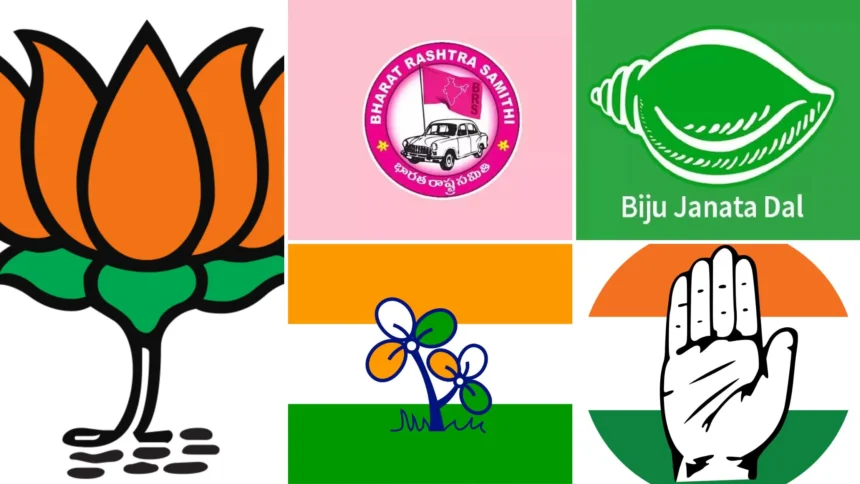In the intricate tapestry of Indian politics, the introduction of electoral bonds stirred both curiosity and controversy. From April 2019 to January 2024, the top five political behemoths, fueled by electoral bonds totaling an eye-watering sum of Rs 11,082 crore from private enterprises, witnessed their destinies intricately entwined with electoral outcomes and public perceptions. The revelations unfurled through data shared by the esteemed Election Commission of India on March 14 paint a vivid portrait of power dynamics and financial intricacies shaping the political ecosystem.
A Glimpse into the Monetary Currents
The Titans: Who Received What?
The quintet at the zenith of political influence includes:
- Bharatiya Janata Party (BJP): Reigning supreme with a staggering total of Rs 6,060.5 crore.
- All India Trinamool Congress (TMC): Surprisingly soaring to the second spot, amassing Rs 1,609.5 crore.
- Congress: Holding firm at the third position with a substantial Rs 1,421.8 crores.
- Bharat Rashtra Samithi (BRS): Commanding a respectable Rs 1,214.7 crore.
- Biju Janata Dal (BJD): Securing a formidable Rs 775.5 crore.
The Electoral Bond Odyssey: A Timeline
BJP: Leading the Charge
The BJP, wielding the baton of the largest recipient, orchestrated a strategic utilization of electoral bonds. The chronicle unfurls with a crescendo before the 2019 Lok Sabha elections, peaking with a redemption of Rs 1,771.57 crore. Amidst the electoral fervor, a lull ensued, with a modest encashment of Rs 15 crore post-polls. The saga continued with nuanced spikes aligned with state assembly elections, culminating in a crescendo preceding the 2023 polls, reclaiming Rs 1,149 crore in a strategic maneuver.
TMC: An Unexpected Ascension
In a riveting twist, the regional stalwart, Trinamool Congress, eclipsed the national opposition, Congress, by leveraging electoral bonds to the tune of Rs 1,609.5 crore. Riding the wave of triumph post-2021 assembly elections, the TMC orchestrated a strategic surge in bond encashment, solidifying its financial foothold.
Congress: Oscillating Fortunes
The Congress, synonymous with India’s political legacy, witnessed a seesaw of fortunes tethered to electoral victories and defeats. Embracing a resurgence post-state victories, the Congress maneuvered its electoral bond strategy, juxtaposing peaks with electoral triumphs, notably leveraging the victory in Himachal Pradesh to bolster its financial arsenal.
BRS: Navigating Turbulent Waters
In a tale of resilience, the Bharat Rashtra Samithi grappled with the aftermath of electoral setbacks, witnessing fluctuations in bond encashment. The ebb and flow mirrored electoral fortunes, with a surge preceding polls and a retreat following defeats, epitomizing the symbiotic relationship between political outcomes and financial influx.
BJD: Weathering the Storm
Amidst the tumultuous political landscape, the Biju Janata Dal navigated the electoral bond currents with adeptness, garnering a substantial corpus amidst the pandemic-induced upheaval. The strategic maneuvering underscored the party’s resilience, poised for the impending electoral fray.
Unveiling the Judicial Verdict
Supreme Court Intervention in Electoral BondsNN
The judicial echelons intervened, casting a discerning eye on the nexus between financial contributions and political quid pro quo. The Supreme Court’s intervention on February 15 cast a spotlight on the implications of electoral bonds, underscoring the imperative for transparency and accountability in political financing.
Implications of Transparency
The revelations precipitated by the Supreme Court’s intervention herald a new era of accountability, underscoring the imperative for transparency in political financing. The directive to disclose bond details serves as a watershed moment, catalyzing a paradigm shift in India’s electoral landscape.
Conclusion: Navigating the Nexus
The saga of electoral bonds unveils a nuanced interplay of power dynamics and financial currents shaping India’s political narrative. As the dust settles, the imperative for transparency and accountability resonates, underscoring the pivotal role of electoral financing in fortifying the democratic edifice. As stakeholders navigate the labyrinthine corridors of power, the clarion call for transparency echoes, heralding a new dawn in India’s electoral ethos.
In the crucible of democracy, transparency emerges as the lodestar guiding the trajectory of electoral integrity and public trust. As India traverses the convoluted terrain of electoral politics, the clarion call for transparency reverberates, heralding a new era of accountability and democratic resilience.



